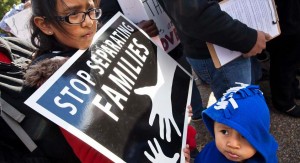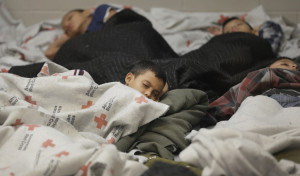See the report here: ‘Refugee’ Or ‘Migrant’: How To Refer To Those Fleeing Home
What Should We Call Those Migrant Refugee Immigrants Seeking Asylum?
California Finally Moves To Regulate Legal Marijuana
New Federal Law Targets Civil Pot-Forfeiture Issues
US Increases Cap On Accepting Refugees
Civil Rights Report Blasts Family Detention Centers For Asylum Seekers
NYT Notes ‘Border Kid’ Crisis Is Not Over, But Has Moved
Medical Cannabis Parents Getting Caught Up with Child Endangerment Charges
As cannabis laws shift at a rapid clip across the country, medical cannabis patients seem to be unexpectedly caught in a web of child protective services. Such was the case for Shawnee Anderson according to Al Jazeera America. An argument over a dirty diaper turned into a loud couple’s squabble, prompting a neighbor to call the police. The fight proved to be the least of their worries as police found remnants of their medical cannabis. The couple spent five days in jail and have been fighting while their son was placed in foster care for nearly two weeks.
This story is not unusual for parents in the 23 states where medical cannabis is legal. While it is legal for medical purposes, civil issues like family law are proving tricky. The article notes that “Meanwhile, low-income families of color are more likely to face neglect charges involving pot, as they tend to live in more heavily policed neighborhoods and give birth in hospitals that may be more likely to conduct drug testing on newborns.”
As we have reported before, the lack of Civil Gideon means there is no requirement that the government provide legal services for people who cannot afford them. This puts low-income families at a significant disadvantage when going up against state child advocates well-versed in the court system. Without legal counsel, parents may lose custody of their children simply for legally consuming a drug.
See more on the story here, “Parents face child abuse investigations over pot use.”
We also recommend following the national story on Shona Banda who is fighting for custody of her son, and against felony charges that could put her in jail for 3 decades. See “This Mom Faces Prison For Medical Marijuana.”
‘Renaissance Mayor’ Embraces Reform in Pensacola
Originally published in the Huffington Post.
As last month’s one-year anniversary of the “Ferguson” protest was duly noted, it became difficult to ignore just how little actual reform has been accomplished as old political issues tried to capitalize on new controversy — like, as Politico noted, using the reforms to try and consolidate towns into larger municipalities.
You can commend the highly cited decision of a Ferguson judge to “suspend” arrest warrants issued prior to Dec. of 2014. However, you also have to note that the order was voluntary and didn’t actually dismiss any cases; it calls for retrials, but since those cases are quasi-criminal it’s hard to see how that would not violate the ban on “double jeopardy.”
Basically, Ferguson remains a mess and illustrates how difficult it can be to change a system. If a town of 20,000 souls can’t find a way to police itself, what chance do we have in larger communities? Indeed, it might be that the smaller cities are the “new incubators” for finding solutions that scale across larger areas, a role that state and local governments have long played.
You can look to places like Compton (yes, THAT Compton) for innovation from that city’s first female mayor, Aja Brown. Or try the beach community of Pensacola, where a native son has transitioned from the private sector to become a “CEO” style leader – and the Republican is embracing a program to bring convicted felons back into the community.
A Pensacola native, Ashton Hayward attended Florida State University and worked in New York City before returning home in 2003. After running successful real estate investment firm, he entered politics with a run for mayor. It was the first election for a newly empowered office as Pensacola shifted to a “strong mayor” form of government. It took a runoff in 2010, but he won and ushered in a great deal of change starting with how the mayor’s responsibilities were categorized.
The mayor’s election is officially non-partisan, but Hayward is a Republican and can sound like the pro-business CEO he was: “We are a first class city that will compete regionally, nationally, and internationally for jobs, investment, and talent,” he says, explaining that he sees his constituents as shareholders in the future of his city. Move over Donald Trump!
He wasted little time. Through a combination of private investment and strong civic entrepreneurship, Hayward has overseen an overhaul of the historic downtown. Gone are the days when businesses struggled to attract large swaths of customers. There are now consumer friendly walk-and-bike environs downtown and it’s likely that thousands of jobs have been created.
“It is my hope that my legacy reflects the fact we have stopped talking about our city’s potential and instead are reaching it,” he says.
The mayor has tackled some of the “big issues” where reform has eluded many other cities, in fairly “conservative” fashion, including tackling public employee pension reforms with three unions, cutting unfunded pension liabilities by 15% and saving taxpayers tens of millions of dollars.
But when it comes to the sort of civil issues like those seeding unrest in Ferguson, the mayor starts sounding downright progressive, including noting that his city, with 50,000 residents, gets only a small part of its budget from policing fees. (Ferguson famously is pretty much funded by tickets and the resulting fees and court incomes, as NPR explains.)
Perhaps reflecting a broader national trend, Hayward is also a vocal supporter of a program called REAP, for “Re-Entry Alliance Pensacola,” which has been working to bring non-violent offenders back into their communities. He didn’t start the program. It was formed (according to its website) when, at the “suggestion of M. Casey Rodgers, Chief Judge Federal District Court for the Northern District of Florida” created the group “… to assist federal inmates returning to our local community. An Inmate Mentoring Program had been previously established in 2012 primarily using local attorneys acting as mentors to inmates participating in the Federal Re-entry Court.”
“Once someone has served the time, paid restitution for his or her crime, and doesn’t pose a threat to others, I think everyone benefits if we work to integrate them as productive, taxpaying citizens,” says Hayward.
Look, as a mayor of any city, it’s tough to ride the wave of political office and not get pulled down by the sort of politics that blocked real change in Ferguson, even amid global headlines and an uprising. But Ashton Hayward has become a bit of a “Renaissance Mayor” and his supporters insist he’s created a swell of popularity and re-energized civic pride.
Which is good news as Ferguson, and doubtless other cities, smolder on.
(… this post is part of an ongoing National Courts Monitor series profiling U.S. mayors.)
Focus Is On Europe’s Refugee Crisis While Similar U.S. Crisis Lingers

As reported in Politico on 8/7/15: US citizens Esmeralda Tepetate, 10, with her brother Sebastian, 2, whose parents are originally from Mexico, holds a sign that says “stop separating families” during a rally for comprehensive immigration reform, Friday, Nov. 7, 2014, outside of the White House in Washington. After the midterm elections immigration groups are pushing for executive action. (AP Photo/Jacquelyn Martin)


